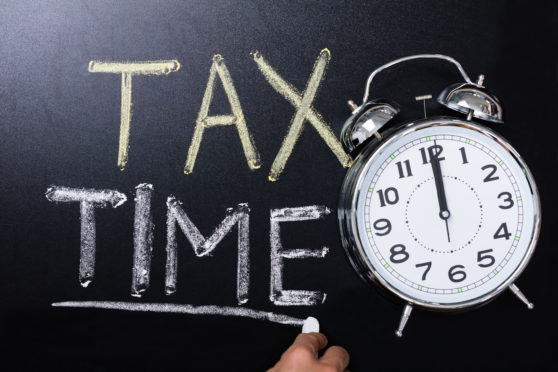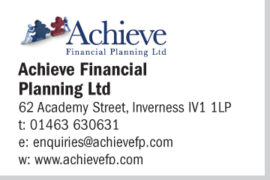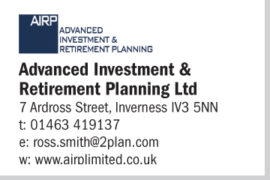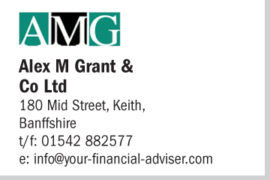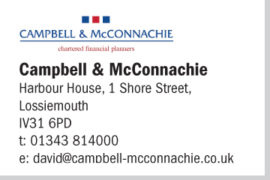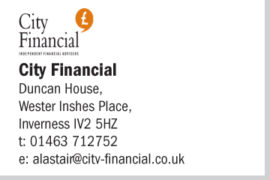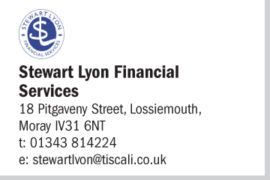INDEPENDENT FINANCIAL ADVICE ON MONEY MATTERS AROUND THE HIGHLANDS, ISLANDS & MORAY
The tax year end, 5th April 2021, is approaching fast. In most cases, tax allowances end with the tax year. In the wake of Covid and with negative interest rates expected,
every penny counts.
Now is an ideal time to think about how you can take full advantage of your
tax reliefs and exemptions before they’re lost. In particular, this year
you should review any decisions you may have made to stop investments
or pension contributions prompted by the financial uncertainty of the
Coronavirus pandemic.
Individual Savings Account (ISA)
1. Make full use of your Individual Savings Account (ISA) allowance. Every year you can save money in an ISA without any tax being charged on any interest or dividends earned.
The saving limit for 2020/21 is £20,000, but you can’t carry it into the next
tax year. With interest rates at historic lows, a stocks & Shares ISA with an appropriate
level of risk may be a better option than a cash ISA where savings are likely to be
eroded by inflation over the longer term.
2. Consider transferring existing investments which are subject to tax into an ISA. If
you have investments held outside an ISA wrapper, a Bed and ISA transaction is a
simple way to invest in a new ISA or top up an existing one. This can be useful if you
want to take advantage of the tax benefits of your ISA but don’t have readily available
cash to invest.
3. There is still time to invest in a Junior ISA for your children or grandchildren to give them a helping hand in the future. Stocks & Shares Junior ISAs will accept investments from as little as £1 up to a maximum of £9,000 per child per year.
Capital Gains Tax (CGT)
CGT is a tax charge when you dispose of an asset that has increased in value. The tax is on the profit you make, but only if the profit is over your annual tax free allowance. This tax year, you can earn up to £12,300 in capital gains without paying CGT on them, so consider selling assets before 5th April to realise gains without paying extra tax.
4. Both spouse/civil partners have the allowance, so there is scope for transferring assets between each other in order to reduce your tax bill.
5. Pay less tax by using losses from previous years to reduce this years gains. In this Covid year, you may have the opportunity to realise losses and then carry them forward to set against gains in future tax years.
Personal Pensions
Currently, you get tax relief on pension contributions of up to 100% of your earnings or
up to £40,000 worth of contributions per year, whichever is lower.
6. Even if you aren’t earning, you should think about starting a pension. The government will add up to £720 in the form of tax relief on the first £2,880 contribution you make per year. This money can be transferred
from other savings and if you are over 55, would remain accessible.
7. Making a pension contribution will reduce your taxable income and therefore the tax you pay. Higher rate tax payers should consider lump sum contributions to benefit from 41% tax relief.
8. Avoid the child benefit tax charge by making a pension contribution to reduce your income below the £50,000 threshold. What’s counted for the purposes of the child benefit High Income Charge is your salary after any pension deductions. This
means if you contribute enough to your pension to get your salary back to £49,999,
you’ll get the full child benefit again.
Personal Allowances
This tax year, your personal allowance – the amount of income you can earn before you
have to pay tax is set at £12,500.
9. The Marriage Allowance lets you transfer £1,250 of your Personal Allowance to your spouse or civil partner, if they earn more than you. This reduces their tax by up to £250 in the tax year. To benefit as a couple, you (as the lower earner) must have an income of £12,500 or less.
10. When your taxable income reaches £100,000, your personal allowance is cut by £1 for every £2 of your income, which means you lose it completely once your
income reaches £125,000.
If you are in this position, you could consider reducing your taxable income so that it falls below the £100,000 level by contributing to a pension or making charity donations.
By contributing to a pension, you are making tax savings in the form of getting
your personal allowance back whilst also saving for your future and benefiting from
pension tax relief at 40%, so you wipe out the 60% effective tax rate completely.
Next month’s topic is on Pre-Retirement
Tax can be complicated, so why not make an appointment with your local Independent Financial Advisers for a no obligation initial discussion? Click to visit their website:
